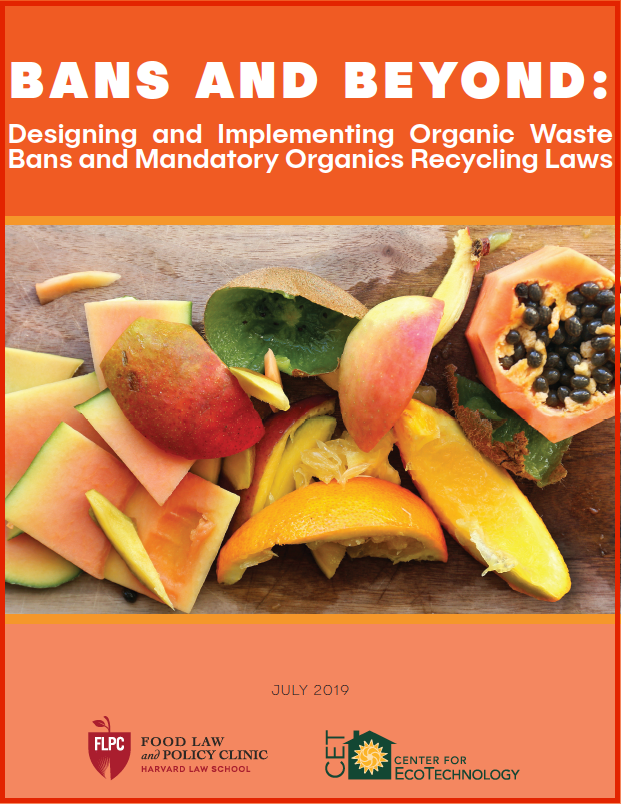Via the Center for Health Law and Policy Innovation
The Harvard Law School Food Law and Policy Clinic (FLPC) and the Center for EcoTechnology released a new toolkit today on state and local organic waste bans, policies that restrict the amount of food or organic waste that can be sent to landfills. Bans and Beyond: Designing and Implementing Organic Waste Bans and Mandatory Organics Recycling Laws serves as a resource for state and local policymakers, regulators, and advocates interested in policy solutions to reduce food waste and keep food out of landfills.
40% of the food in the United States goes uneaten. The challenge of food waste has significant impacts on the economy, food insecurity, and the environment. Not only does this wasted food require a significant amount of water and energy to produce, but most of it ends up in landfills, where it breaks down and generates methane, a potent greenhouse gas. And now, cities and states are facing an additional barrier: they are running out of space to store trash.
In recent years, state and local governments have explored policies to reduce food waste. Organic waste bans are one of the most innovative categories of policies. By restricting the amount of food waste that businesses and even individuals can dispose of in landfills, organic waste bans can drive adoption of more sustainable practices. Cost-benefit analyses have shown the potential of organic waste bans to reduce greenhouse gas emissions while stimulating local economies and creating green jobs. In Massachusetts, the state’s organic waste ban supported over 900 jobs in the organic waste hauling, processing, and food rescue industries in 2016 and generated $175 million in industry activity.
Bans and Beyond examines the legal landscape of existing state and local organic waste bans. This landscape is constantly evolving: six states and seven municipalities across the country have now passed organic waste bans, and three of these policies passed within the last year. The toolkit analyzes the structure of these different policies and the challenges that jurisdictions have faced in implementing them—for example, challenges with accessing funding, developing effective enforcement mechanisms, and building sufficient organics recycling infrastructure.
The toolkit also analyzes nine additional sets of policies and programs that can be implemented to incentivize waste reduction. These policies are essential to creating an environment where organic waste bans can succeed, and can also be effective policy tools to reduce food waste in states where an organic waste ban or recycling mandate may not be feasible. For example, states and localities can provide grant funding for food waste reduction, recovery, and recycling programs; revise permitting and zoning regulations to facilitate the development of composting facilities and anaerobic digesters; and implement “pay as you throw” systems that charge residents based on the amount of waste they throw out, in order to encourage residents to reduce their waste disposal and increase recycling and composting.
This toolkit builds on other resources FLPC has produced to support states and localities in addressing food waste through policy. FLPC’s 2016 toolkit, Keeping Food Out of the Landfill, offers an array of policy suggestions for reducing food waste, from strengthening food donation liability protections to offering tax incentives for food donors to implementing organic waste bans. Today’s toolkit builds on that with much more detail about organic waste bans.
With greater public attention on food waste, organic waste bans have become increasingly popular in the years since Keeping Food Out of the Landfill was published. Organic waste bans have the potential to transform waste management systems and drive food waste reduction, recovery, and recycling. FLPC hopes that Bans and Beyond will support state and local efforts to identify and advance organic waste management policies that are the best fit for the local context.
Filed in: Legal & Policy Work
Contact Office of Clinical and Pro Bono Programs
Website:
hls.harvard.edu/clinics
Email:
clinical@law.harvard.edu
